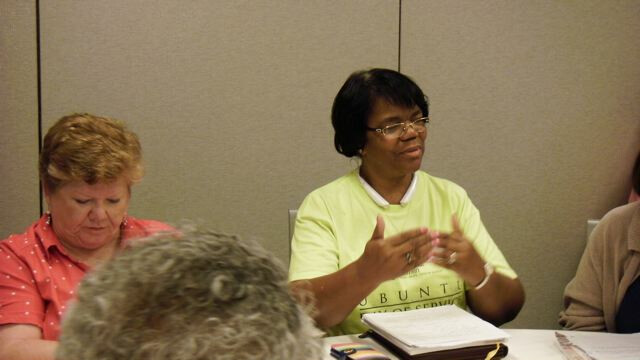Mission u participants explore covenant, transformation
By Linda Worthington
UMConnection Staff
Nearly 30 women gathered in a side-room at the Pooks Hill Marriott Hotel July 28-30, all newcomers to Mission u, the former School of Christian Mission. The Rev. Andrea Middleton King, dean of this year’s gathering, and Deaconess Jane Grays met them to explain the ins and outs of the yearly event.

They were just a few of the 200 people, mostly women, from throughout the Baltimore-Washington Conference who attended “to (learn) together for the transformation of the world,” the defining statement of Mission u.
The theme “We are One: Connected in Covenant,” was conceptualized in three study areas: Living as a Covenant Community; three separate classes on Climate Justice: Call to Hope and Action
Mission u is designed to bring many opportunities to attendees to grow in their discipleship through looking in depth at the topic areas and to grow spiritually through the plenary sessions on the theme.
The Rev. Neal Christie, Assistant General Secretary for Education and Leadership Formation at the General Board of Church and Society in Washington, D.C., led the sessions on
Covenant is both personal and public, he said. It involves a personal relationship with God and public vows, such as a wedding ring symbolizes. “The outcome is a changed relationship,” he said. Covenants are made between you and God and between you and neighbor, he said. At one point, the group was urged to write their own personal covenants. “If you were to write a covenant between you and God, what would be in it?” he asked.
The study on Missionary Conferences looked at the three conferences that fit the description: Alaska, Oklahoma, and Red Bird in Kentucky. Each seeks to meet the needs of a specific people in the region: native or indigenous Inuit and others in Alaska; Native Americans in Oklahoma; and the Appalachian population in Kentucky. In each case, missionaries began the initiative with the people because “they wanted the culture to know about Christ,” said the Rev. Wendy van Vliet who serves Davidsonville UMC.
Being a missionary has changed since those early days in the 19th or 20th centuries, she said. Today the operative word is to be in
While the adults were meeting in plenaries and classes, 18 youth from the conference were holding their own Mission u in another part of the hotel. Their dean, the Rev. Alexis Brown, campus minister at Howard University, was in South Korea on a mission/study tour, and assistant dean, the Rev. Matthew Tate, pastor of Emmanuel UMC in Huntingtown, took the reins.
The main topic was “We are Called Out: Project to deal with self-esteem and bullying.” Martina Martin, a Provisional Deacon, serving at Lincoln Park UMC on Capitol Hill, led the plenaries. Martin, a full-time psychotherapist at Whitman-Walker Health, said that art and art therapy are her passion. She led the youth to discover new ways to deal with their “God-identity” through art therapy.
Several focus groups were held, optional programs of both substance and fun. These informal groups heard from panels and experts in the field. One on mass incarceration explored reentry issues, the conditions in prisons, especially women’s prisons, and women’s needs. At least two carloads of personal items were collected from the churches to deliver to the women’s prison.
